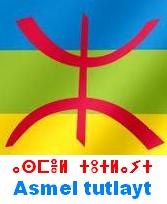Tagwanchit - guanche - guanches- canarias
Amawal:
Altaha: homme de grande valeur
Acorán: Dieu du Soleil
Tagrawla: la révolution
Belingo: fun, party
Tamarco: veste en cuir
Axa: de chèvre
Ahul Felawen: Bonjour, camarade
Magec: le Soleil
Vacaguaré: je veux mourir
Tilellít: la liberté
Azarug: l'indépendance
Banot: Massue de guerre
Echedey: qui secoue
Tizziri: Moonlight Ataman: ciel
Hana: les moutons
Sansofe: bonjour
Tihaxa: bélier
Ahemon: l'eau
Guatativoa: traiter
achicaxna: méchant
Tezezes: de longues cannes
Magados: clubs
ANEPA: baton
Guayota: génie du mal
Gánigo: navire
Ahoren: farine d'orge
usigh t id sg : http://ananayra.blogspot.com/
***************************
Bayfo: small goat, baby goat
Belet?: the first milk after a pregnancy period (normaly in animals like goat or cows or sheeps...)
Ha?a: goat
Goro: circle with stones to keep the livestock
Gofio: a kind of flour we use to eat with milk
Magua (?) I've seen this word in Tamazight, like mawa for us is the things or feelings of anything in the past that we wanted to do or to have. But the specialists they say it comes from Portugal.
Mago: a person from fields. In Guanche it exist Magec or Magek that means "Sun" Their God was the Sun, but they use to call their God like Acoran, Alborahan, Achaman... They said that the ancient spirits went arround the sun, and sometimes they came through the seas in a form of small clouds...
Ma?o: (?) a person from the fields. Some opinions say that this is a name that Spanish had gave to the still guanches in the fields after conquest, having the same branch than Mauritaine. The most of the people in cities nowadays are descendants of ma?os
Sanaca: (?) it means anything like "idiot" we pronounce it like /sanaak/. I had a friend from Mauritanie and he has told me that they use the form "zanegg" in reference on a tribe ¿zanata?, and that tribe is the lowest one, so they use it between others like saying "you don't have any idea" Could it be the same sens?
Tabefe = Tabique: whey, the rest of the milk when we make cheese.
Teberite a mark made in goat"s ears (we pronounce it like /teberiit/) to recognize them.
Tenique: a kind of stone (we pronounce like /teniik/)
Tolete: (?) a silly person (like /tol?t/)
Belet?: the first milk after a pregnancy period (normaly in animals like goat or cows or sheeps...)
Ha?a: goat
Goro: circle with stones to keep the livestock
Gofio: a kind of flour we use to eat with milk
Magua (?) I've seen this word in Tamazight, like mawa for us is the things or feelings of anything in the past that we wanted to do or to have. But the specialists they say it comes from Portugal.
Mago: a person from fields. In Guanche it exist Magec or Magek that means "Sun" Their God was the Sun, but they use to call their God like Acoran, Alborahan, Achaman... They said that the ancient spirits went arround the sun, and sometimes they came through the seas in a form of small clouds...
Ma?o: (?) a person from the fields. Some opinions say that this is a name that Spanish had gave to the still guanches in the fields after conquest, having the same branch than Mauritaine. The most of the people in cities nowadays are descendants of ma?os
Sanaca: (?) it means anything like "idiot" we pronounce it like /sanaak/. I had a friend from Mauritanie and he has told me that they use the form "zanegg" in reference on a tribe ¿zanata?, and that tribe is the lowest one, so they use it between others like saying "you don't have any idea" Could it be the same sens?
Tabefe = Tabique: whey, the rest of the milk when we make cheese.
Teberite a mark made in goat"s ears (we pronounce it like /teberiit/) to recognize them.
Tenique: a kind of stone (we pronounce like /teniik/)
Tolete: (?) a silly person (like /tol?t/)
Tagwanchit - guanche - guanches- canarias-espania- ile canaries
********************************************************
Arique au lieu de soga (corde)
Chola au lieu de calzado de playa(chaussure de plage)
Gánigo au lieu de vasija de barro (poterie)
Baifo au lieu de cabrito (cabri)
Mago au lieu de campesino (paysan)
Tagoror au lieu de lugar de reunión (local de réunion)
Chola au lieu de calzado de playa(chaussure de plage)
Gánigo au lieu de vasija de barro (poterie)
Baifo au lieu de cabrito (cabri)
Mago au lieu de campesino (paysan)
Tagoror au lieu de lugar de reunión (local de réunion)



